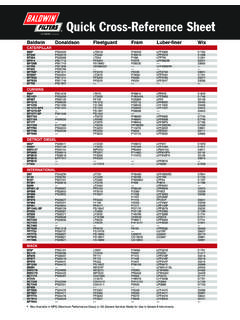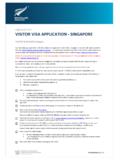Transcription of STRATEGIC MANAGEMENT IN GOVERNMENT: …
1 1 STRATEGIC MANAGEMENT IN GOVERNMENT: extending THE REFORM MODEL IN NEW ZEALANDby Alex Matheson, Gerald Scanlan, and Ross TannerState Services Commission, New Zealand1 IntroductionThe idea that government2 can manage itself strategically, in a similar manner to well-performingprivate sector organisations, has featured prominently in new zealand s contributions to PUMA worksince 1994. The purpose of this paper is to outline the rationale for a STRATEGIC approach to governmentmanagement, to describe the elements of the approach which we have developed, to assess its impact todate on the performance of government and to point out future opportunities and for a STRATEGIC Approach to GovernmentGovernment is a complex business requiring high quality critical determinant of successful government is the ability to make good decisions, andmanage their implementation.
2 Modern government is complex. It requires thousands of decisions to betaken and acted upon each day. The compound effect of these decisions is enormous, due to the size andpervasiveness of government . The dramatic decline of new zealand s fortunes during the 1970s and early1980s exposed the inherent flaws in our version of the traditional model of centralised governmentdecision-making and MANAGEMENT . We discovered the cumulative costs of poor decisions the hard learnt that, under stress, centralised authority fails to cope with entrenched features of publicadministration such as value conflicts, ambiguity and uncertainty over cause and effect, asymmetries ofinformation about performance and the likely consequences of decisions, skewed incentives, and thedifficulty of distinguishing at any given moment the accidental from the systemic, and the trivial from thesignificant.
3 1 This paper was presented by Ross Tanner, Deputy State Services Commissioner, to the OECD s PublicManagement Service. It was written by Gerald Scanlan, drawing on papers prepared within the State SectorDevelopment Branch of the State Services Commission, under the leadership of Alex this paper, government refers to the compete system of public governance and MANAGEMENT , including bothpolitical and administrative dimensions; government refers solely to the Ministers who collectively exercisepolitical public sector reforms begun in 1986 reflected the realisation that our arrangements forgovernment decision-making and MANAGEMENT needed a radical overhaul.
4 new zealand set aboutdeveloping a MANAGEMENT system that would provide greater assurance of the quality of decision makingand the overall level of performance. For high quality decisions it is important that people areappropriately empowered. It is vital that they have a good understanding about government s overallpriorities and the types of behaviour being sought, and about the impact of their decisions and actions onthe government system. It is important that good information be available to them or that they haveincentives to get that information. It is also crucial that those people be held properly accountable for managers manage improved the quality of shift from centralised regulation to decentralised MANAGEMENT was the defining event in NewZealand's public sector reform.
5 Deregulation of the public service compelled managers to move from apassive compliance mentality to an active MANAGEMENT mentality. The contractual emphasis in the NewZealand model pushed the need for intelligent decisions on resource allocation down through theadministrative chain to the point at which services are delivered. This forced managers at every level tofocus on the government 's objectives, to manage the risks to those and to become more responsive to therequirements of the recipients of their services. Freedom of information legislation, introduced prior to thereforms, was instrumental in changing attitudes to the value of information, and in improving the volumeand quality of information about government .
6 Decisions at all levels are now based on better information,better budgeting processes and a longer time process of clarifying objectives and then demanding good quality information on theirachievement illuminated what public servants actually do and assisted decisions around resourceallocation, notably during a period in which government was reduced in size. However, there are limits tothe gains to be had through specification and monitoring. While the reforms made government moremanageable, they did not in themselves ensure that decisions affecting the longer-run interests ofgovernment as a whole were properly balanced against the particular interests of the component parts.
7 Thedevolved MANAGEMENT system tended to obscure the fact that government is a single enterprise, whichshould be unified around commonalties of purpose, behaviour, MANAGEMENT standards and commitment to the collective interests of government was an early priority of the NationalGovernment3 after it was first elected in , though necessary, is insufficient for effective trigger for a STRATEGIC approach to managing government was the realisation that effectivepublic governance now requires the capacity to design and execute long-term solutions to complexproblems, often with fuzzy boundaries and both international and inter-generational has become a truism of business that the increasingly integrated global economy is testing thecompetence of managers to the limit.
8 government , too, operates in an international market for ideas,people, reputation, information and policies. Democratisation, the information revolution and global 3 new zealand held its first general election under the new proportional electoral system (MMP) on 12 October1996. At the time this paper was presented to the PUMA meeting in early November, the identity of the newGovernment had not been determined. On 11 December, a coalition government was formed in which theNational party is the majority have reduced the capacity of governments to control conditions within their borders relative tothe international community, while increasing the relative autonomy of their citizens and raising theirexpectations of only decision-making model which can cope with these conditions is one based ondirectional signals about the government s purpose and priorities, which guide decisions takenautonomously by managers close to the action.
9 Good decisions then depend on a high-quality flow ofinformation, well-tested analysis and advice, and a balanced set of controls, plus the ability to learn andadapt. We can capture these insights about the modern conditions for optimal performance in the motif:direction, autonomy and control. Implicit in this formulation is the idea of dynamic equilibrium betweenthe three governance more effective challenges the role of government as in business, one of the greatest benefits arising from the adoption of a strategicapproach to decision-making is the premium it places on identifying and strengthening core leads to a disturbing question: what is government good for?
10 In the initial period of reform, the questionwas posed in the negative: what is government not good for, and therefore should no longer do? Now weare better placed to identify the important and unique job that government has to do, and has to be good atdoing. Aberbach and Rockman4 propose that government s essential competence lies in its ability to: make quality long-term decisions; create and distribute knowledge; implement decisions effectively; and mediate amongst competing government also means good government , since the quality of government willincreasingly determine international competitive advantage. In the words of one commentator looking tothe requirements for national success in the next century:While efficiency is a necessary condition of wider prosperity and influence, it is notsufficient.

















